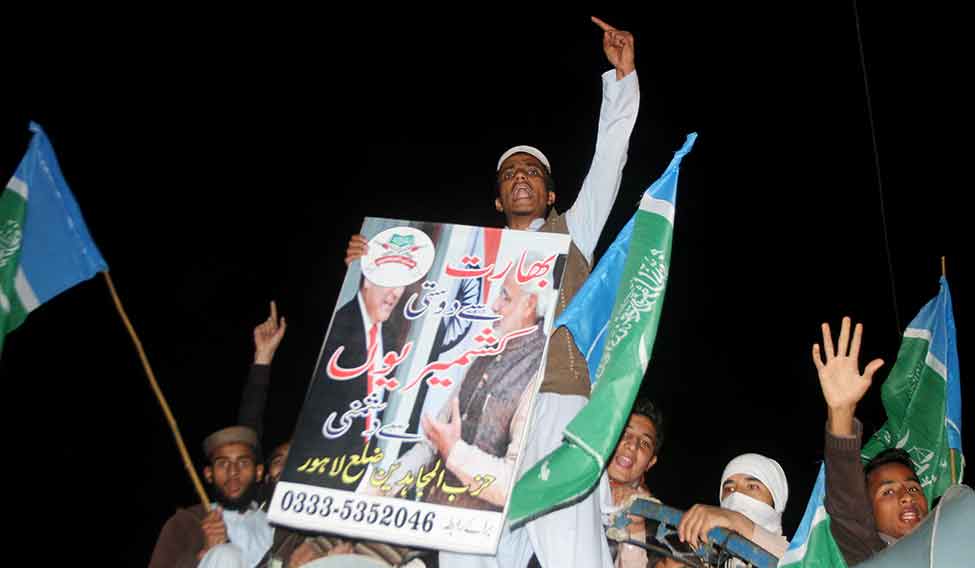Around noon on Christmas Day, while Pakistan was celebrating the birthday of Mohammed Ali Jinnah—the country’s founder—another pleasant development started shaping up. Indian Prime Minister Narendra Modi chose to announce that development himself through Twitter, first greeting Pakistan Prime Minister Nawaz Sharif on his birthday and then saying that he would be stopping in Lahore, Sharif's hometown, on his way back from Kabul to Delhi that day. A visit by an Indian premier to Pakistan after more than a decade surprised and shocked everyone.
Soon enough, all news channels were discussing what this visit meant, and how it had come about? The Pakistani government insisted that it was an absolute surprise. The Indians also claimed the same. Insiders on both sides said there was chatter within official circles about a VIP visiting Lahore soon, but no one had any idea who.
A few hours after his tweet, footage of Modi’s plane entering the Allama Iqbal international airport was broadcast live on local media. Sharif was there with his team to welcome Modi. The two PMs shook hands, hugged each other and walked on the tarmac holding hands. A chopper was waiting for them to take Modi to Sharif's residence on the outskirts of his hometown. The meeting between the two leaders, which was later dubbed as ‘stealth diplomacy’, happened during the wedding of Sharif’s granddaughter. Later, Sharif also went to drop Modi at the Lahore airport, something Modi appreciated in a tweet.
But Lahore isn’t just Sharif's hometown. It is also a stronghold of the Pakistan army, which is known for its India-centric policy when it comes to identifying the enemy. And talks with different officials of the military reflect that as yet, it has no plans to change its policy towards India, of which a major part is allegedly allowing geographical space and at times material support to Kashmiri militants like the Lashkar-e-Taiba. Many among the civilian leadership now and in the past have tried to become independent of this policy, but it has not gone down well with the Pakistan army. Observers feel that with India as an enemy, the Pakistan army can continue to remain relevant and justify its exorbitant expenditures—a serious burden on Pakistan’s economy.
So as Modi and Sharif appeared to be winning a round of civilian diplomacy with this surprise visit, a media narrative in Pakistan began seeing it as badly planned. The first of such spin-talk came from a reporter of a local news channel in Lahore. During one of his live updates soon after Modi’s landing, the reporter said: “Never before has this happened in a democracy where no respect is given to the laws of the land. One hundred and twenty people have been allowed entry into Lahore without a visa. This is shameful.” He then held both his ears—a gesture usually associated with seeking forgiveness—and said “Tauba, Tauba [shame, shame].” Soon, #TaubaTauba was trending on Twitter in Pakistan.
Later, on the Pakistani parliament floor, the government was forced to clarify that only eleven people were given visas, each of which was properly marked with entry and exit stamps. Also, it rejected rumours of more than a hundred people being allowed into Lahore, and said majority of the delegation stayed at the airport.
Also, the presence of Sajjan Jindal, a well-known Indian industrialist, in Lahore city at the same time as Modi became a controversy. Some TV personalities in Pakistan suggested that it was he who had arranged this meeting, owing to his personal business interests in Afghanistan via Pakistan. Many believe Jindal wants to fast-track the peace dialogue so that trade between the two neighbours can resume, thus benefiting his business empire. Cricketer-turned-politician Imran Khan, a political rival of Sharif tweeted: “We welcome the thaw in Pak-India relations but to have a business associate arrange the 2 PMs mtgs has an underlying conflict of interest.”
This is also similar to the narrative one hears from the military. A senior military official called it a personal business meeting. “Everything happened on the business front, rather than on the diplomatic one,” said the official. “And no one from Pakistan’s side was present that could have skilfully turned this gesture from the Indian side into a diplomatic or even an economic advantage for Pakistan. The beneficiaries of this development are only the Indians.” According to the military official, the fact that the recently appointed National Security Adviser, the retired Lieutenant General Nasir Khan Janjua, was not present in this interaction was not a good sign.
Another senior intelligence official associated with the Pakistan army said military circles in Pakistan were not too comfortable with this relationship dynamic. “Modi is trying to create a wedge [between civil-military relations in Pakistan] by exhibiting more of a personal relationship,” explained the official.
When Modi came to power, Sharif had attended his oath-taking ceremony, which was hailed as a positive move. Following that, there was much talk of resuming the suspended peace dialogue until the impasse over Kashmir conflict, put it back to square one. However, many attribute the reversal of the positive tide to the independent policy that Sharif's government was pursuing until the military told him that their man had to do the job. That is when Janjua was appointed NSA. “This meeting does not mean much; if there is to be any significant breakthrough, it will definitely involve the NSAs,” said Muneeb Farooq, a popular political talk show host based in Lahore.
During this brief meeting between the two premiers, it was agreed upon that their foreign secretaries would meet in January, but observers expect little from these talks so long as the core issues are not settled. “All major issues between Pakistan and India are at a standstill,” said Farooq. “So, where is the change?”
The author is a Pakistani journalist.





